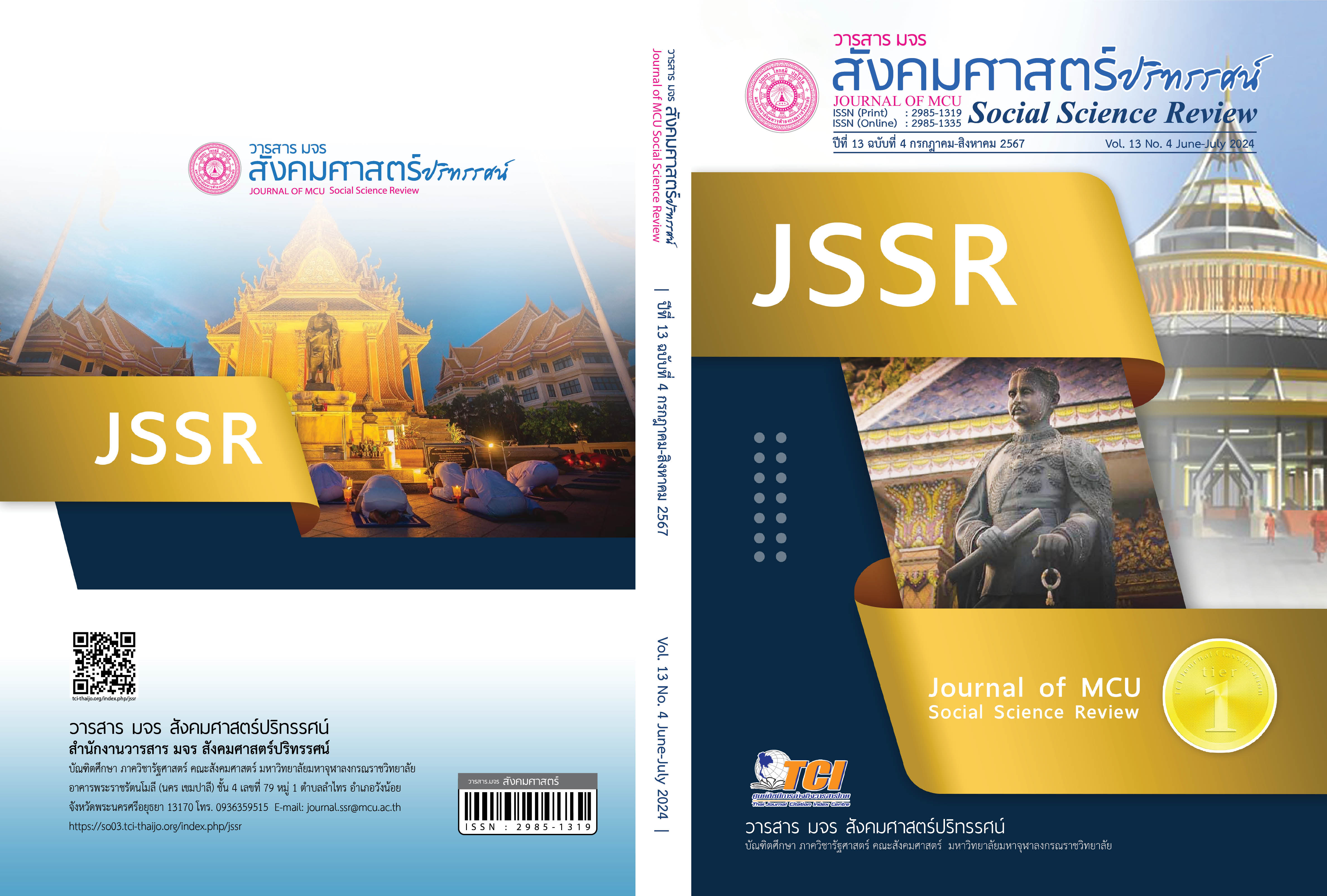การวิเคราะห์องค์ประกอบของชุมชนแห่งการเรียนรู้ทางวิชาชีพครู ที่ส่งผลต่อการปฏิบัติงานของครูในโรงเรียนมัธยมศึกษา
คำสำคัญ:
ชุมชนแห่งการเรียนรู้ทางวิชาชีพ, มาตรฐานการปฏิบัติงานของครู, การวิเคราะห์องค์ประกอบบทคัดย่อ
บทความวิจัยนี้มีวัตถุประสงค์ 1. ศึกษาระดับการดำเนินงานขององค์ประกอบของชุมชนแห่งการเรียนรู้ทางวิชาชีพครูในโรงเรียนมัธยมศึกษา 2. ศึกษาระดับการปฏิบัติงานตามมาตรฐานการปฏิบัติงานของครูในโรงเรียนมัธยมศึกษา 3. วิเคราะห์องค์ประกอบของชุมชนแห่งการเรียนรู้ทางวิชาชีพครูที่ส่งผลต่อการปฏิบัติงานตามมาตรฐานการปฏิบัติงานของครูในโรงเรียนมัธยมศึกษา เป็นวิจัยเชิงปริมาณ ประชากรคือ โรงเรียนที่ได้รางวัลชนะเลิศและรองชนะเลิศระดับเหรียญทอง สถานศึกษายอดเยี่ยมระดับมัธยมศึกษาของ สพฐ. ด้าน PLC ระดับชาติ 11 โรงเรียน ผู้ให้ข้อมูล คือ ครูผู้สอนในโรงเรียน 665 คน เครื่องมือที่ใช้คือ แบบสอบถาม วิเคราะห์ข้อมูลโดยการวิเคราะห์ถดถอยพหุคูณแบบปกติ เพื่อศึกษาค่าสัมประสิทธิ์การอธิบายและค่าสัมประสิทธิ์ถดถอยพหุคูณของตัวแปรทำนายแต่ละองค์ประกอบ วิเคราะห์ถดถอยแบบพหุคูณเป็นขั้นตอน เพื่อคัดเลือกตัวแปรทำนายที่ร่วมกันส่งผลได้ดีที่สุดต่อการปฏิบัติงานและในการทำนายของแต่ละสมการ
ผลการวิจัยพบว่า องค์ประกอบของชุมชนแห่งการเรียนรู้ทางวิชาชีพครู ในโรงเรียนมัธยมศึกษา ที่มีระดับการดำเนินงานมากที่สุด คือ องค์ประกอบที่ 5 ชุมชนกัลยาณมิตรการปฏิบัติงานของครูโรงเรียนมัธยมศึกษา ที่มีระดับการปฏิบัติงานมากที่สุด คือ ด้านที่ 1
การปฏิบัติหน้าที่ และองค์ประกอบของชุมชนแห่งการเรียนรู้ทางวิชาชีพครูที่ส่งผลต่อการปฏิบัติงานของครูมากที่สุด คือ องค์ประกอบที่ 6 โครงสร้างสนับสนุนชุมชน
เอกสารอ้างอิง
ข้อบังคับคุรุสภา ว่าด้วยมาตรฐานวิชาชีพ พ.ศ. 2556. (2556, 4 ตุลาคม). ราชกิจจานุเบกษา. เล่ม 130 ตอนพิเศษ 130 ง. หน้า 65-66.
ฉัตรชัย หวังมีจงมี. (2560). สมรรถนะของครูไทยในศตวรรษที่ 21: ปรับการเรียน เปลี่ยนสมรรถนะ. Journal of HRintelligence, 12(2), 47-63.
ซาโต้ มานาบุ. (2559). การปฏิรูปโรงเรียน แนวความคิดชุมชนแห่งการเรียนรู้กับการนำทฤษฎีมาปฏิบัติจริง. กรุงเทพฯ: ปิโก (ไทยแลนด์).
นิวัตต์ น้อยมณี และกัญภร เอี่ยมพญา. (2560). จิตวิญญาณครู (พิมพ์ครั้งที่ 2). นนทบุรี: 21 เซ็นจูรี่ จำกัด.
ปรณัฐ กิจรุ่งเรือง และอรพิณ ศิริสัมพันธ์. (2561). ชุมชนแห่งการเรียนรู้เชิงวิชาชีพครู กลยุทธ์การยกระดับคุณภาพการศึกษา:แนวคิดสู่การปฏิบัติ. กรุงเทพฯ: M&N DesignPrinting.
พรทิพย์ ทับทิมทอง. (2560). การวิเคราะห์ผลของการใช้เวลาในการปฏิบัติภาระงานสอนที่มีต่อประสิทธิภาพการสอนของครู ในสังกัดสำนักงานคณะกรรมการการศึกษาขั้นพื้นฐาน. OJED An Online Journal of Education, 12(2), 353-369.
พรรณทิภาภรณ์ อภิปริญญา. (2561). สภาพปัญหาของการสร้างชุมชนการเรียนรู้ทางวิชาชีพของโรงเรียนในสำนักงานเขตพื้นที่การศึกษามัธยมศึกษา เขต 1 และเขต 2 กรุงเทพมหานคร. OJED And Online Journal of Education, 14(2), 1-12.
ยนต์ ชุ่มจิต. (2553). วิชาชีพครู. กรุงเทพฯ: โอเดียนสโตร์.
เรวณี ชัยเชาวรัตน์. (2558). แนวคิดชุมชนการเรียนรู้ทางวิชาชีพเพื่อพัฒนาวิชาชีพครู. วารสาร ครุศาสตร์ มหาวิทยาลัยราชภัฏสุรินทร์, 10(1), 34-46.
ศิริวรรณ วณิชวัฒนวรชัย. (2559). การจัดการเรียนรู้ที่เน้นความแตกต่างระหว่างบุคคล. วารสารศึกษาศาสตร์ มหาวิทยาลัยศิลปากร, 13(2), 65-75.
สำนักงานคณะกรรมการการศึกษาขั้นพื้นฐาน. (2562). คู่มือการประเมินรางวัลทรงคุณค่า สพฐ. OBEC AWARDS เล่ม 1-3. กรุงเทพฯ: กระทรวงศึกษาธิการ.
______. (2563). ข้อมูลครู/บุคลากร. สืบค้น 10 มีนาคม 2564, จาก http://data.bopp-obec.info/emis/index/php
สำนักพัฒนาครูและบุคลากรการศึกษาขั้นพื้นฐาน. (2560). คู่มือประกอบการอบรมการขับเคลื่อนกระบวนการ PLC (Professional Learning Community) ชุมชนการเรียนรู้ทางวิชาชีพสู่สถานศึกษา. กรุงเทพฯ: กระทรวงศึกษาธิการ.
Akkaraputtapong, P. (2020). The supervisory behaviour preference of Thailand’s in-service teachers. Retrieved January 4, 2021, from https://shorturl.asia/Z9uV3
Bryk, A. S. & Schneider, B. (2002). Trust in Schools: A Core Resource for School Improvement. New York: Russell Sage.
Dufour, R. (2004). What Is a Professional Learning Community. Educational leadership: journal of the Department of Supervision and Curriculum Development, 61(8), 6-11.
Dufour, R. et al. (2006). Learning by Doing A Handbook for Professional Learning Communities at Work. Bloomington, IN: Solution Tree Press.
Hord, S. M. (1997). Professional Learning Communities: Communities of Continuous Inquiry and Improvement. Austin, Texas: Southwest Educational Development Laboratory.
ดาวน์โหลด
เผยแพร่แล้ว
รูปแบบการอ้างอิง
ฉบับ
ประเภทบทความ
สัญญาอนุญาต
ลิขสิทธิ์ (c) 2024 วารสาร มจร สังคมศาสตร์ปริทรรศน์

อนุญาตภายใต้เงื่อนไข Creative Commons Attribution-NonCommercial-NoDerivatives 4.0 International License.
เพื่อให้เป็นไปตามกฎหมายลิขสิทธิ์ ผู้นิพนธ์ทุกท่านต้องลงลายมือชื่อในแบบฟอร์มใบมอบลิขสิทธิ์บทความให้แก่วารสารฯ พร้อมกับบทความต้นฉบับที่ได้แก้ไขครั้งสุดท้าย นอกจากนี้ ผู้นิพนธ์ทุกท่านต้องยืนยันว่าบทความต้นฉบับที่ส่งมาตีพิมพ์นั้น ได้ส่งมาตีพิมพ์เฉพาะในวารสาร มจร สังคมศาสตร์ปริทรรศน์ เพียงแห่งเดียวเท่านั้น หากมีการใช้ภาพหรือตารางหรือเนื้อหาอื่นๆ ของผู้นิพนธ์อื่นที่ปรากฏในสิ่งตีพิมพ์อื่นมาแล้ว ผู้นิพนธ์ต้องขออนุญาตเจ้าของลิขสิทธิ์ก่อน พร้อมทั้งแสดงหนังสือที่ได้รับการยินยอมต่อบรรณาธิการ ก่อนที่บทความจะได้รับการตีพิมพ์ หากไม่เป็นไปตามข้อกำหนดเบื้องต้น ทางวารสารจะถอดบทความของท่านออกโดยไม่มีข้อยกเว้นใดๆ ทั้งสิ้น





